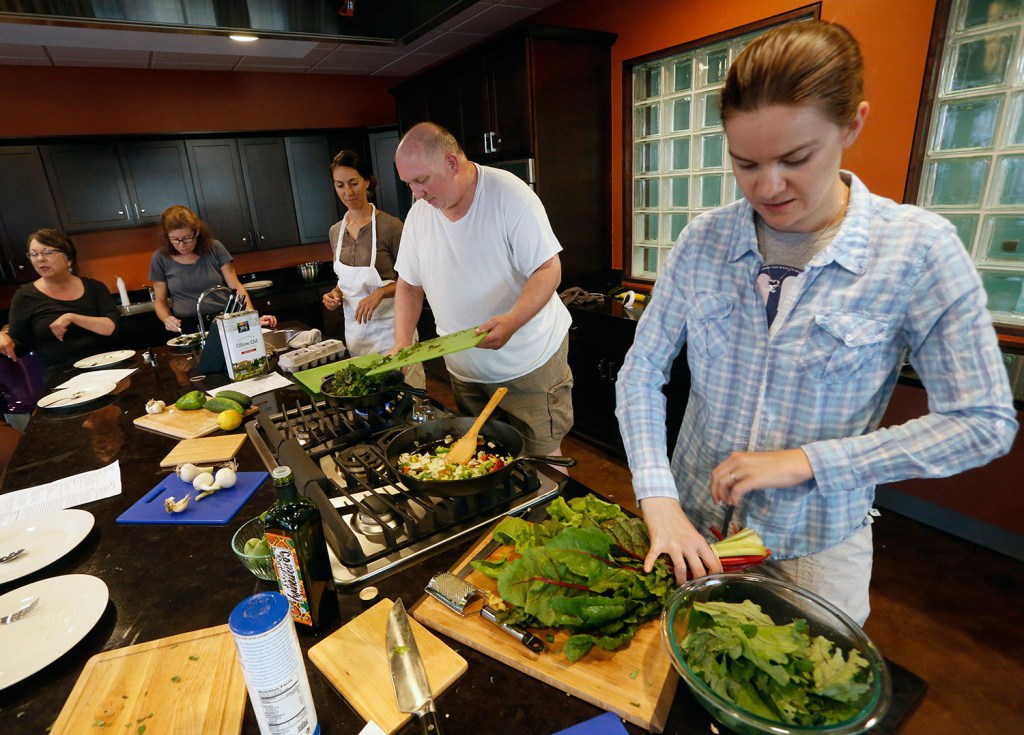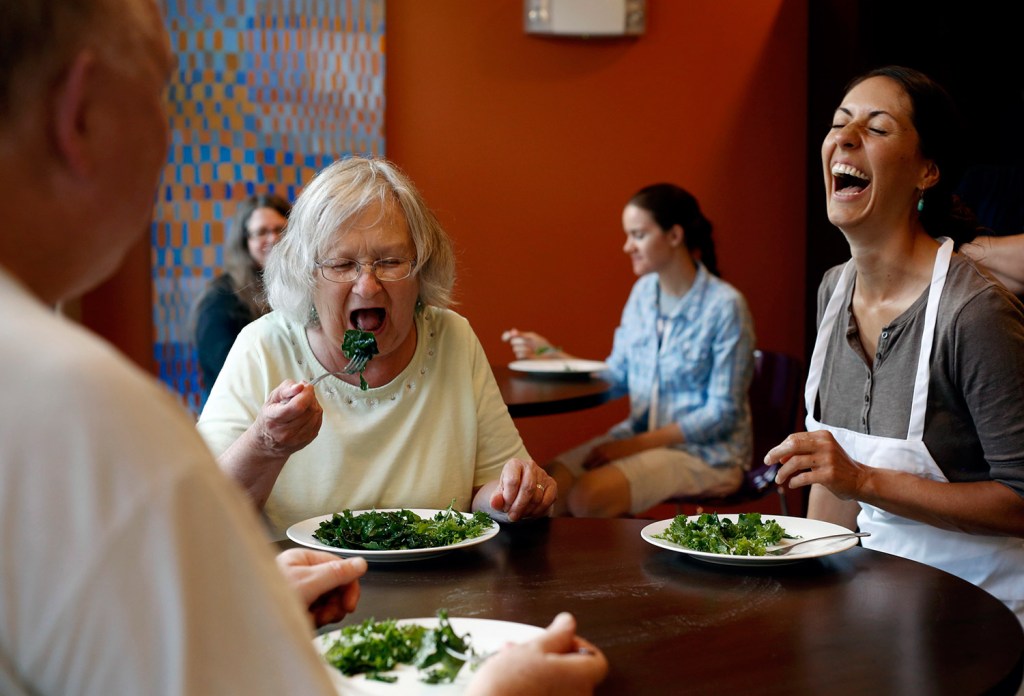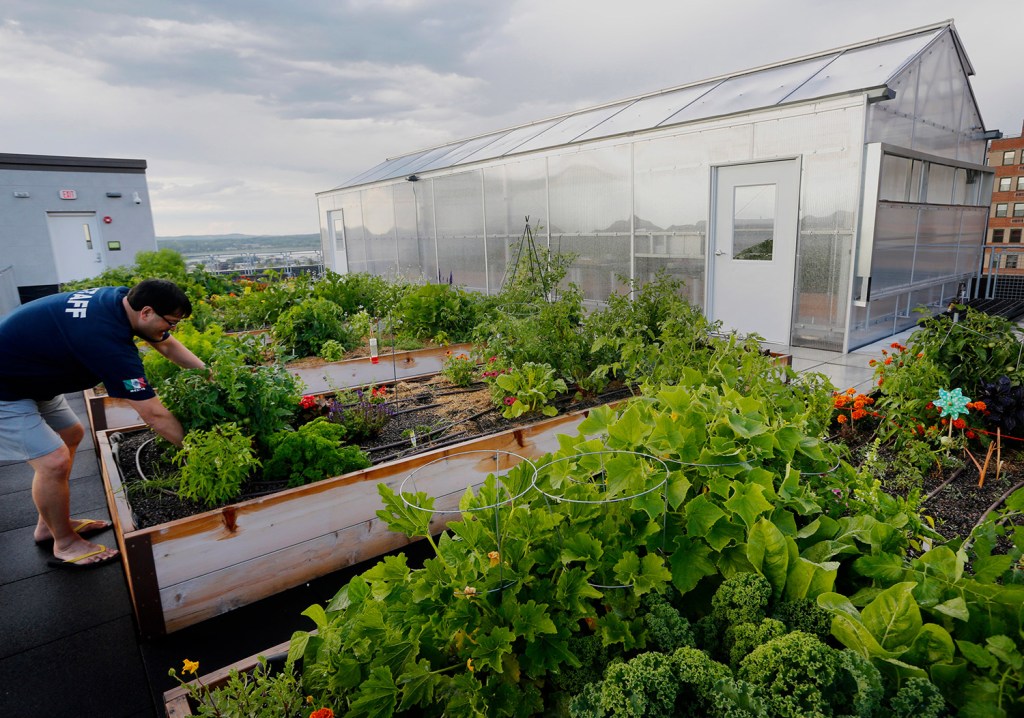When Avesta Housing began planning its new mixed-income affordable housing building in Portland in 2009, leaders of the nonprofit developer took stock of what was happening in the city culturally. Healthy living, local foods and sustainability were all the rage. Could they incorporate those values into the project as it rose from a dirt and gravel parking lot at the corner of Cumberland and Forest avenues?
But, President and CEO Dana Totman readily admitted, “We didn’t know anything about this food and gardening stuff.” The developers turned to Cultivating Community’s Craig Lapine. He knows gardening but at ground level, so this was new territory for him as well, because the developers wanted to site the gardens – and a greenhouse – on the roof.
There’s a growing trend nationwide for rooftop gardens in market-rate complexes filled with more productive crops than the traditional ficus trees, hedges and ornamental trees of the past. To a much lesser extent, the rooftop vegetable garden is catching on in affordable housing developments in America’s largest urban centers, including New York and Los Angeles. Avesta had no local model to build on and relied heavily, Totman said, on Google to find examples for inspiration.
“I think this is the first rooftop community garden in Portland and maybe Maine,” Lapine said.
The complex, known as 409 Cumberland, opened in January. There are 57 apartments, mostly studios and one bedrooms, 46 of which are designated as affordable housing. Income limits vary, but generally those units are rented to people who make no more than 60 percent of median income for the Portland area, or about $41,640 for a family of three.
About 35 residents claimed plots on the roof, either in the neat line of raised beds or inside the greenhouse, and by the first week of August, residents had already started seeing the fruits of their labor. Barbara Kerwin, 80, dubbed her plot Jurassic Park and the name is apt. Within the thriving tangle are tomatoes, peppers, beets, carrots and beans (green and wax). “There is a Brussels sprout in there somewhere,” Kerwin said. “I’m not quite sure where.”
Laura Mailander, an urban agricultural specialist with Cultivating Community who oversees the gardening program and teaches classes in both growing and preparing foods, said the residents she’s working with mostly divide into two groups. There are novices who are eager to learn about growing their own food and then people like Kerwin, who has plenty of experience in gardening but had gone without a place to grow. Kerwin, a retired nurse who has been renting in various locations in Portland before moving into 409 Cumberland (on the day after one of the January blizzards), said she hadn’t had access to land for 15 years. She’d grown up visiting her grandparent’s farm in Danvers, Massachusetts, and had cultivated big gardens as an adult whenever she could. She, like most residents of affordable housing in the city, had been on a waiting list for a new spot for a long time. (There are about 2,500 people on Avesta’s lists for affordable housing in Southern Maine, according to Totman, and in the first six months of 2015, there were 27 percent more applicants for housing than usual.) When Kerwin heard that the complex would include an option to garden, she said she was thrilled.
Kerwin’s Jurassic Park is located inside the greenhouse, where the raised beds were easier for her to reach with her arthritis and where she’d be protected from what can be fierce winds on the rooftop, with its sweeping views of Back Cove and, on a clear day, Mount Washington. She’s “pretty much vegetarian” and believes in buying organic and local, so the foods she’s growing have already been a regular part of her diet. She said the plot is enough to supplement but not replace her trips to the produce aisle, simply because the plot is too small to grow everything she and her husband need.
But this past week, she harvested tomatoes and beet greens, which she steamed and tossed with olive oil, vinegar and salt. She also took a cooking class from Mailander – 409 Cumberland has a full, open kitchen on its ground floor – on how to prepare kale and Swiss chard, which many residents are growing. No kale for Kerwin, not even prepared raw in a salad the way Mailander had demonstrated. “I still don’t like it,” Kerwin said.
The kitchen serves a dual purpose. City officials had wanted Avesta and the project’s architects, CWS of Portland, to include activities that could be seen from the street, so there is a conference room that is available for nonprofits in the community to use as a meeting place. They can break for lunch, as a youth group does regularly, in the kitchen and dining area.
As Avesta was moving toward realizing its goal of making healthy living a focus of the complex, it confronted the same challenges that have slowed progress in making rooftop gardens a full-blown trend in affordable housing. “We got some sticker shock,” said Seth Parker, director of real estate development.
To cope with the extra costs, Avesta had to get creative with financing. The building is only four stories, and it is wood-framed, which is cheaper than building a steel-framed structure. But to be able to take the load of the soil – the nine main raised beds contain 72 tons of it – on the roof, part of it had to be steel framed. In addition, the rooftop had to be fully accessible to residents, with an elevator and two stairwells brought up to roof level, Parker said. Parker estimates that the price of the complex was about $750,000 higher because of the garden and greenhouse. Those extra costs were met by grants from the Federal Home Loan Bank of Boston and NeighborWorks America.
In a study of rooftop gardens and affordable housing in the Los Angeles area, conducted by an Occidental College student, the concept was welcomed by developers but then shunted aside in some instances because it was simply too expensive. That’s not to say they don’t exist. Los Angeles does have a few affordable housing developments with rooftop gardens, including one on Skid Row that opened in 2011 to provide housing for the homeless. In Manhattan, a rooftop garden open to the community was a key focus of an affordable housing project in Harlem that opened in late 2014; it includes a public access point via a staircase from 126th Street and was designed by an architectural firm called Elmslie Osler. There are also two such projects in the Bronx. Rooftop gardening in general is popular in cities like Seattle and Chicago, where the municipalities have encouraged them as a means to offset the heat island effects from urban developments. That’s when the overall temperature of a city is raised by sunshine being absorbed and radiated off the waterproof sealants on roofs.
That’s one of the reasons affordable housing owners are interested in rooftop gardens, said Douglas Robinson, a spokesman for NeighborWorks America, a housing development nonprofit. Rooftop farming specifically is not a trend in affordable housing, but incorporating community gardens is and has been for several years.
“Developers and the different funders around affordable housing have really been trying for the last few years to make their properties just like market rate properties,” he said. That doesn’t mean putting in health clubs, but it does mean trying to get residents involved. “To keep the turnover costs low, that is, to keep residents in the properties, they want to really engage their residents.”
In some lower income urban areas where there are few supermarkets, sometimes referred to as “food deserts,” a community garden can make a difference in healthy food options for residents. 409 Cumberland may not be in a food desert, but if we have another Siberian-like winter, 409 Cumberland resident Barbara Kerwin will be able to take the elevator to the roof and pick herself some fresh spinach or greens. High homegrown.
Send questions/comments to the editors.







Success. Please wait for the page to reload. If the page does not reload within 5 seconds, please refresh the page.
Enter your email and password to access comments.
Hi, to comment on stories you must . This profile is in addition to your subscription and website login.
Already have a commenting profile? .
Invalid username/password.
Please check your email to confirm and complete your registration.
Only subscribers are eligible to post comments. Please subscribe or login first for digital access. Here’s why.
Use the form below to reset your password. When you've submitted your account email, we will send an email with a reset code.